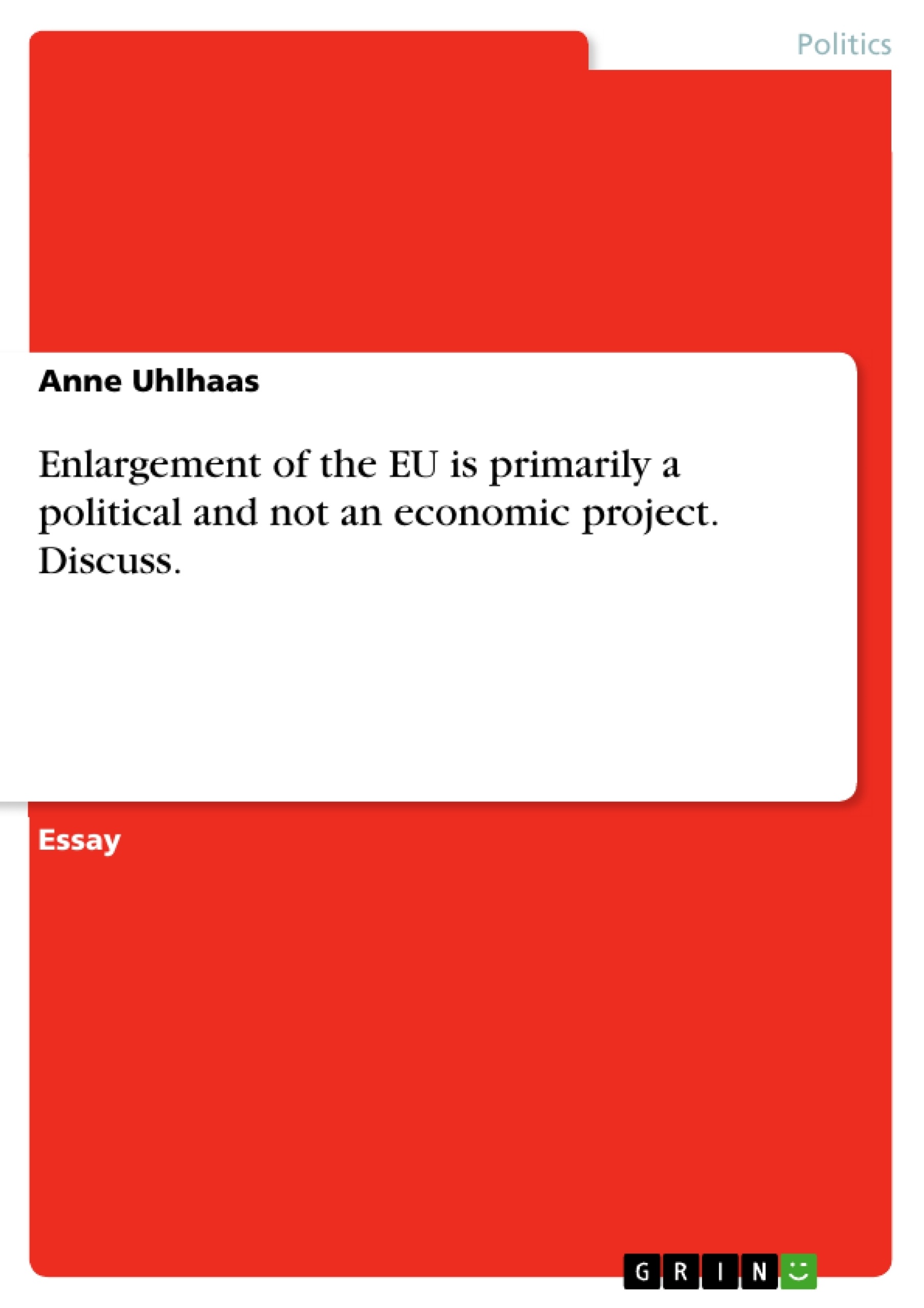The posed question comprises three different issues which have to be investigated. To answer the question properly you have to fragment the project of enlargement and analyse enlargement in terms of reasons and motives for it, problems in the forefront of it and gains and losses caused by it. Investigating these issues I will argue that enlargement is primarily a political rather than an economic project. This does not mean that economy is not an important factor in the process of enlargement, but that the political factors prevail.
To support my argument, due to topicality, I mainly want to examine the current process of Eastern enlargement as an example for enlargement of the EU in overall terms. I first want to work out the motives and reasons which have to be given to make enlargement happen at all. I will raise the question of why enlargement is so important for the EU and why it consistently exposes itself to the problems of this change instead of remaining as it is. I will then refer to the problems which erupt in the process of enlarging the EU, and will investigate the requirements for enlargement concerning both member states and candidate countries. As a third subject I want to refer to the gains and losses implicated in enlargement. In this regard, I want to look at both immediate consequences of enlargement for the member states and other outcomes in terms of the future perspective of the EU as a political actor all over the world. Finally, I will sum up my results and explain, why especially the question of enlargement requires careful political decisions.
Inhaltsverzeichnis (Table of Contents)
- Introduction
- The discussion
- Motives and reasons for enlargement
- Problems in the run-up to enlargement
Zielsetzung und Themenschwerpunkte (Objectives and Key Themes)
This paper aims to analyze the enlargement of the European Union, particularly the recent Eastern enlargement, arguing that it is primarily a political project rather than an economic one. The paper will explore the motives and reasons behind enlargement, investigate the challenges and problems associated with it, and examine the gains and losses for both member states and candidate countries.
- The political motivations behind EU enlargement.
- The challenges and problems associated with EU enlargement, particularly in relation to economic and political disparities between member states and candidate countries.
- The impact of enlargement on EU institutions and policies.
- The role of public opinion in the enlargement process.
- The gains and losses for both member states and candidate countries as a result of EU enlargement.
Zusammenfassung der Kapitel (Chapter Summaries)
- Introduction: The introduction outlines the key arguments of the paper and sets out the structure of the discussion. It argues that enlargement is primarily a political project driven by historical responsibility and the need to fulfil the EU's founding goal of a united Europe.
- Motives and reasons for enlargement: This section examines the political motivations behind EU enlargement, highlighting the EU's commitment to democratic values, its historical responsibility towards Eastern Europe, and its desire to promote peace and stability within the continent.
- Problems in the run-up to enlargement: This section explores the challenges facing the EU in the process of enlargement. It focuses on the economic and political disparities between member states and candidate countries, the financial implications of enlargement, and the need for institutional reforms to accommodate new members.
Schlüsselwörter (Keywords)
The core topics of this paper are European Union enlargement, Eastern enlargement, political and economic motivations, challenges and problems of enlargement, institutional reforms, public opinion, and the gains and losses for member states and candidate countries.
Frequently Asked Questions
Is EU enlargement primarily a political or an economic project?
The paper argues that while economics is a significant factor, political motivations such as democratic values, historical responsibility, and regional stability are the primary drivers.
What are the main political motives for EU enlargement?
Key motives include fulfilling the EU's founding goal of a united Europe, promoting peace on the continent, and supporting democratic transitions in Eastern Europe.
What challenges arise during the Eastern enlargement process?
Challenges include significant economic and political disparities between current members and candidate countries, as well as the need for institutional reforms within the EU.
How does enlargement affect EU institutions?
Enlargement requires structural changes to accommodate a larger number of member states, ensuring that decision-making processes remain efficient and effective.
What role does public opinion play in the enlargement process?
Public opinion is a critical factor that can influence political decisions and the speed of the accession process in both member states and candidate countries.
What are the potential gains and losses of enlargement?
Gains include a larger market and increased geopolitical influence, while losses or risks include financial burdens and potential social tensions due to economic disparities.
- Arbeit zitieren
- Anne Uhlhaas (Autor:in), 2002, Enlargement of the EU is primarily a political and not an economic project. Discuss., München, GRIN Verlag, https://www.grin.com/document/11517



